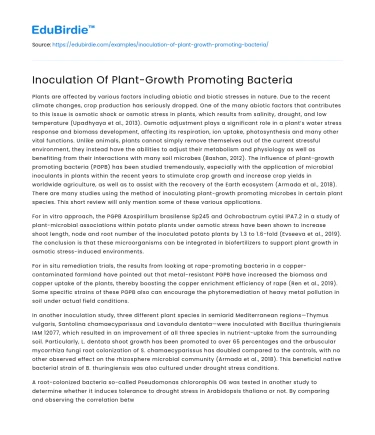Plants are affected by various factors including abiotic and biotic stresses in nature. Due to the recent climate changes, crop production has seriously dropped. One of the many abiotic factors that contributes to this issue is osmotic shock or osmotic stress in plants, which results from salinity, drought, and low temperature (Upadhyaya et al., 2013). Osmotic adjustment plays a significant role in a plant’s water stress response and biomass development, affecting its respiration, ion uptake, photosynthesis and many other vital functions. Unlike animals, plants cannot simply remove themselves out of the current stressful environment, they instead have the abilities to adjust their metabolism and physiology as well as benefiting from their interactions with many soil microbes (Bashan, 2012). The influence of plant-growth promoting bacteria (PGPB) has been studied tremendously, especially with the application of microbial inoculants in plants within the recent years to stimulate crop growth and increase crop yields in worldwide agriculture, as well as to assist with the recovery of the Earth ecosystem (Armada et al., 2018). There are many studies using the method of inoculating plant-growth promoting microbes in certain plant species. This short review will only mention some of these various applications.
For in vitro approach, the PGPB Azospirillum brasilense Sp245 and Ochrobactrum cytisi IPA7.2 in a study of plant-microbial associations within potato plants under osmotic stress have been shown to increase shoot length, node and root number of the inoculated potato plants by 1.3 to 1.6-fold (Evseeva et al., 2019). The conclusion is that these microorganisms can be integrated in biofertilizers to support plant growth in osmotic stress-induced environments.
Save your time!
We can take care of your essay
- Proper editing and formatting
- Free revision, title page, and bibliography
- Flexible prices and money-back guarantee
For in situ remediation trials, the results from looking at rape-promoting bacteria in a copper-contaminated farmland have pointed out that metal-resistant PGPB have increased the biomass and copper uptake of the plants, thereby boosting the copper enrichment efficiency of rape (Ren et al., 2019). Some specific strains of these PGPB also can encourage the phytoremediation of heavy metal pollution in soil under actual field conditions.
In another inoculation study, three different plant species in semiarid Mediterranean regions—Thymus vulgaris, Santolina chamaecyparissus and Lavandula dentata—were inoculated with Bacillus thuringiensis IAM 12077, which resulted in an improvement of all three species in nutrient-uptake from the surrounding soil. Particularly, L. dentata shoot growth has been promoted to over 65 percentages and the arbuscular mycorrhiza fungi root colonization of S. chamaecyparissus has doubled compared to the controls, with no other observed effect on the rhizosphere microbial community (Armada et al., 2018). This beneficial native bacterial strain of B. thuringiensis was also cultured under drought stress conditions.
A root-colonized bacteria so-called Pseudomonas chlororaphis O6 was tested in another study to determine whether it induces tolerance to drought stress in Arabidopsis thaliana or not. By comparing and observing the correlation between the amount of stomatal closures and the resistance to drought stress with the emitted 2R,3R-butanediol metabolite from P. chlororaphis O6 during root colonization, the researchers believe they have found good evidence that the increasing production of 2R,3R-butanediol and their huge effect on plants when P. chlororaphis O6 colonized plant roots might signify that plant performance, especially under environmental stressors, is significantly impacted by saprophytic microbes and the compounds they create (Cho et al., 2008).
In addition, some other studies have also suggested that in comparison with single-rhizobial inoculation in plants, the co-inoculation of two or more microorganisms can further benefit plant growth and increase agronomic expectations (Morel et al., 2015). For example, the co-inoculation of alfalfa with Sinorhizobium meliloti U143 and JD2 has been shown to promote plant yields in greenhouse conditions, indicated by the increase in shoot and root matter. The cell-free extracellular cultures produced during the co-inoculation of alfalfa also has a plant-growth promoting effect.
To verify the expected plant-microbial constructive responses to climate change-induced osmotic stresses, searching for suitable PGPB strains within the rhizosphere-microbiome is really crucial and would in turn be valuable for successfully designing environment-friendly biotechnological formulations (Evseeva et al., 2019). It is also under great consideration that the secondary metabolites produced during the co-inoculation of certain plants with rhizobia may have applications in agrobiotechnological methods (Morel et al., 2015). Through the above studies about plant inoculations and the beneficial results showing in plant growth due to intimate plant-microbial relationships, and many similar studies in the past or are currently conducting, we can look forward to more application of plant inoculation as a good approach for improving crop yields all over the world and even for recovering our biosystem as a whole. For future studies, it would be great to see more invest in in situ experiments in a lot more different regions of the world to test for the effectiveness of plant-microbial interactions toward plant growth and product yields in various practical field settings.






 Stuck on your essay?
Stuck on your essay?

